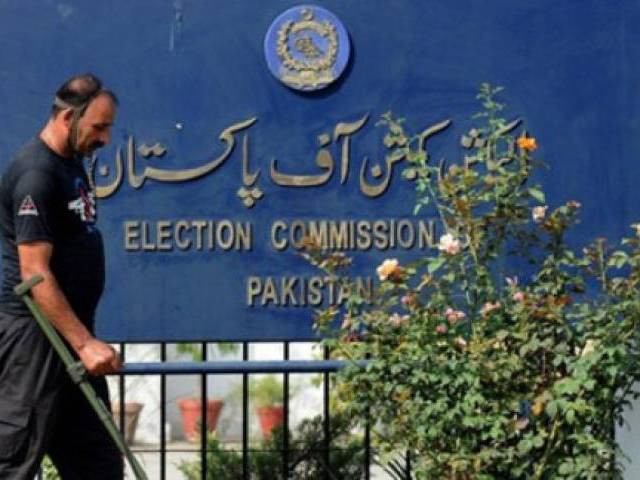ECP seeks review of SC order on Punjab poll
Commission says Section 58 of Elections Act gives it exclusive right to announce election schedule

The Election Commission of Pakistan (ECP) on Wednesday filed a petition in the Supreme Court, seeking a review of its order to conduct polls in Punjab on May 14.
In the plea, the commission maintained that changing the election programme was the solitary domain of the ECP under Section 58 of the Elections Act, 2017.
The commission added that the order was “per incuriam (lacking regard to the law or the facts) to the Constitution, law and previous judgments”.
The ECP maintained that the apex court “should have exercised judicial restraint and could have apportioned responsibility to the commission”.
Last month, the SC declared as “unconstitutional” the ECP’s decision to postpone elections in Punjab till October -- in a blow to the government that has been trying to delay the provincial polls citing security issues and the economic crisis.
A three-member bench -- headed by Chief Justice of Pakistan Umar Ata Bandial and comprising Justice Munib Akhtar and Justice Ijazul Ahsan -- also fixed May 14 as the date for the polls in the province.
On March 22, the ECP delayed the provincial assembly elections in the politically crucial Punjab province by more than five months, citing the deteriorating security situation in the cash-starved country, a move criticised by PTI chief and deposed premier Imran Khan.
Since his ouster last April in a no-confidence vote in parliament, Imran has been demanding early elections.
Prime Minister Shehbaz Sharif has dismissed the demand and remained stuck to the ruling coalition’s demand of holding elections in one go later this year.
Read Cabinet body okays tweaks in electoral law
The electoral watchdog contended in the petition that under no provision of the Constitution or the law could the court have taken such an exercise upon itself to fix a date for the elections.
“The superior courts can define the contours within which the power (which vests in the public bodies) is or is to be exercised. At no instance, can the superior courts take upon themselves the role of the public body. With utmost deference, the appointing of the date for the election is not the mandate of superior courts under the Constitution,” it added.
It continued that such power existed elsewhere under the Constitution but certainly did not lie in a court of law.
The commission further argued that “appointing of date or changing it, is an executive exercise, and certainly not a judicial exercise”.
“The ECP appears to simply have no choice, given the strict timeline to meet for the elections, but to accept as a fate accompli, a security plan which may be compromising the integrity, honesty and fairness of the elections,” the petition added.
The electoral watchdog also stressed on a “strong and empowered commission”.
It stated that the SC with its April 4 order “has actually divested the powers of the commission to itself” and made the ECP “virtually toothless” as well as “disregarded its constitutional jurisdiction”.
“It is not suggested that Article 254 of the Constitution should be used to stultify the constitutional imperative of holding elections within 90 days, but the Hon’ble Court needs keenly to look at the ground realities,” the ECP wrote in the petition.
The plea also highlighted the “trichotomy of power”.
Read more ECP receives complaint against Nisar, Imran for ‘selling PTI tickets’
It argued that the division of power between different organs of the State was the “hallmark of the Constitution” and “essential sine qua non” for the smooth and efficient functioning of the country.
“This well-embedded constitutional concept isolates the three organs from interfering and treading into the domain of the other. The judicial institution has been conferred the power to judicially review the actions and decisions of the executive while at the same time being restrained from exercising the executive authority itself,” it noted.
The ECP plea pointed out that the top court, in its March 1 order in connection with holding elections to the Punjab and Khyber-Pakhtunkhwa assemblies within 90 days, relied upon Section 57 of the Elections Act, 2017 to designate the president as authority for the appointment of date where the assemblies stood dissolved by efflux of time.
“The Hon’ble Supreme Court identified an authority for announcing the date for the general elections (i.e. the president) by interpreting the Constitution as well as the law and restraining itself from appointing a poll date, keeping in view the well-entrenched principle of trichotomy of powers,” it continued.
“The order under review [April 4], submitted with utmost humility, also goes contrary to the spirit of the order dated 01.03.2023 where this august court found the repository of the power being president under Section 57 of the Constitution to appoint a poll[s] date for general elections where the assemblies stood dissolved by efflux of 48 hours. It is also not conceivable why this Hon’ble Court took upon itself the task of appointing a poll[s] date which certainly is not the constitutional function, respectfully submitted, assigned to the judicial organ of the state,” the commission pointed out.
The electoral watchdog requested the apex court to “accept the instant review petition by revisiting, reviewing, reconsidering and recalling its April 4 order”.


















COMMENTS
Comments are moderated and generally will be posted if they are on-topic and not abusive.
For more information, please see our Comments FAQ